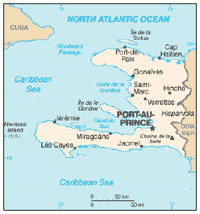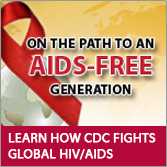Haiti
HIV/AIDS in Haiti
- 2.2% Estimated Prevalence
(Age 15–49) (2012) - 6,587 New HIV Infections (2013)
- 6,610 Estimated deaths due to HIV (2013)
- 62,602 Reported Number of People Receiving Antiretroviral Treatment (ART) (2014)
- 115,700—137,000 Estimated Number of People Eligible for ART (2014)
SOURCE:
DHS, 2012; UNAIDS Global Report 2013; UNAIDS estimates 2014; MESI.ht

Strategic Focus
The CDC Haiti office opened in 2002. Working in close collaboration with Haiti’s Ministry of Health (MSPP), CDC is supporting the national response to HIV/AIDS by increasing the accessibility and quality of HIV clinical services, building health care infrastructure, and strengthening surveillance, epidemiology, laboratory, and health management information systems. CDC is focusing its efforts on supporting the Government of Haiti in preventing the transmission of HIV/AIDS, providing care and treatment to those already infected, preventing mother to child transmission, increasing laboratory and strategic information capacity, and building health care infrastructure.
Strengthening Health Systems
To ensure a sustainable and robust health system, CDC is filling critical staffing needs, supporting training programs for medical and paramedical personnel, refurbishing health facilities, strengthening Ministry of Health governance and financial management mechanisms, and establishing strategic information systems for informed decision-making.
Strengthening Laboratory Systems and Networks
CDC is working with the National Public Health Laboratory to develop multiple testing capacities, including polymerase chain reaction (PCR) for diagnosis of HIV in infants, CD4 testing, and testing for opportunistic infections in HIV-infected people. CDC is also helping the country to establish an external quality assurance program and a training curriculum to build capacity for laboratory accreditation.
Notable Accomplishments
- Supported the expansion of antiretroviral therapy (ART) to 53 percent of eligible people living with HIV in 2014 (CD4≤500)
- Ensured availability of PCR for early infant diagnosis throughout the country via an established referral/transport network
- Promoted intensified case finding for TB, resulting in an approximate 33% increase in detection of new cases in 2014 since 2010
- Strengthened blood safety by supporting increased collection of blood from 8,711 units in 2003, to 27,439 units in 2013, with 100% units tested for HIV1, HIV2, HTLV1, HBsAG, HVC, and syphilis
- Strengthened the national laboratory’s capacity to provide quality diagnostic tests for TB, HIV, and other critical diseases via the establishment of a tracking system for collection and transport of biological specimens
Established an electronic medical record system covering 96 percent of HIV care and treatment sites
Created a web-based reporting and surveillance system for HIV, TB, and reproductive health data
Constructed an HIV case notification database which captures more than 95 percent of reported cases each year in the public sector
Expanded external quality assurance practices at 204 laboratories and 135 HIV care sites in the country
Supported the expansion of programs to prevent mother-to-child transmission to 87% of women in need and improved adherence to the comprehensive package of services for HIV-positive mothers and HIV-exposed infants
Click here for more information about PEPFAR’s role in Haiti.
Contact Us:
- Centers for Disease Control and Prevention
1600 Clifton Rd
Atlanta, GA 30333 - 800-CDC-INFO
(800-232-4636)
TTY: (888) 232-6348
24 Hours/Every Day - cdcinfo@cdc.gov
 ShareCompartir
ShareCompartir



